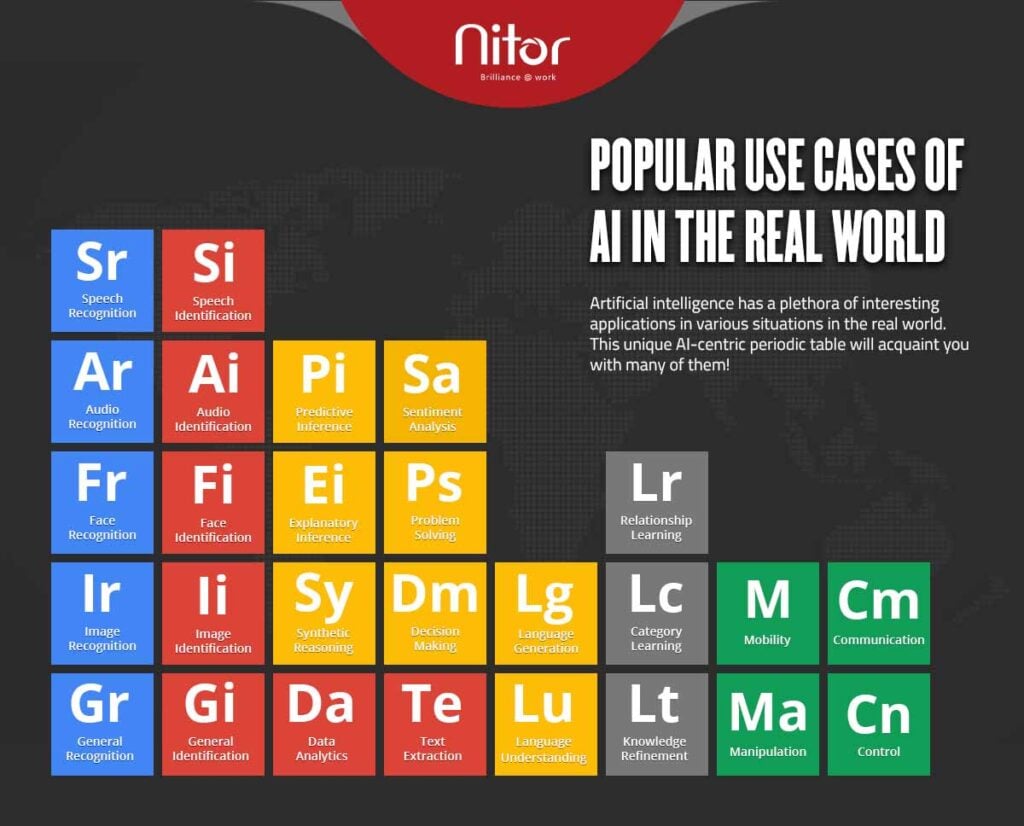Artificial intelligence | 26 Oct 2023 | 11 min
Popular Use Cases of Artificial Intelligence in the Real World

Your maps assistant makes sure you reach your destinations at the right time, your autocorrect promptly lets you know whenever you might misspell a word, and apps display neat lists of recommendations drawn from your recent search data… Essentially, from when you enjoy your first cup of tea in the morning till the time your head hits your pillow, wherever you turn, you are likely to see manifestations of the subversive emerging technology of artificial intelligence.
Take a look at this interesting infographic that contains several use cases of AI in the real world:

In this blog, we will be getting acquainted with 27 of these popular use cases of AI. Let’s dive in…
1. Speech Recognition – Once your voice data is captured, AI can understand your voice, and can help you automate repetitive tasks, such as answering FAQs, booking appointments, verifying information, and routing calls. Thus, saving a lot of time and increasing efficiency.
2. Speech Identification – Developing a voice-activated system involves AI-powered speech recognition to secure voice data and implement robust testing and automation. This guarantees dependable and precise voice-activated functionality across all products, enhancing the customer experience.
3. Audio Recognition – AI technologies, like NLP and ML, work their magic on speech and audio data, making them ace transcribers, voice-command listeners, and experts at recognizing sounds.
This can help improve your product’s accessibility, enhance user engagement through voice-controlled features, and enable personalized content recommendations for your users.
4. Audio Identification – AI, powered by NLP and deep learning, excels at recognizing individuals, boosting security in voice assistants, and safeguarding intellectual property.
5. Face Recognition – You might have looked at various screens scanning your face and recognizing who you are. Well, from airports to smartphones, AI comes with security making manual check-ins hassle-free.
Additionally, as a next-generation product, you can leverage it to recognize loyal customers or frequent buyers and provide tailored promotions to foster lasting customer loyalty.
6. Face Identification – Digital screens can spot faces using algorithms to measure the space between your eyes and mouth. It can spot known shoplifters, organized retail criminals, or people with a history of fraud when they enter stores. Thus, streamlining security and identity verification and coming in very handy for banking and retail apps.
7. Image Recognition – Think of image recognition as AI’s visual superpower, spotting objects in images with ease. It doesn’t just see; it also helps computers understand and categorize images. This streamlines tasks such as sorting products and keeping track of your inventory.
8. Image Identification – It’s loyal like your informative companion, making product recognition and patient identification easy. Thus, boosting learning and decision-making in fields like healthcare, retail, manufacturing, and more.
9. General Recognition – It can find objects and pull-out text from pictures, making things easier for storage and document organization.
10. General Identification – AI knows who you are! From face recognition to secure logins, it’s your digital bouncer ensuring your safety and personalizing your online world.
11. Predictive Inference – Ever wonder how businesses predict the future? AI and machine learning use predictive inference to foresee trends, from finance to supply chains, like a crystal ball for smarter decisions! Now you can manage your opportunities and threats better while looking into the data patterns.
12. Sentiment Analysis – Also called emotion AI, it analyzes pieces of writing to point out how satisfied your customers are with your products or services. You can leverage this to form marketing strategies and create product enhancements.
13. Explanatory Inference – Explanatory inference uses logic in AI to explain how decisions are made, helping in fields like – law, medicine, and complex problem-solving with clear step-by-step insights.
14. Problem Solving – This can look like crafting efficient algorithms, heuristics, and root cause analysis. Thus, streamlining complex issue resolution and better decision-making for your business.
15. Synthetic Reasoning – Researchers are on a journey in AI, aiming to make machines think a lot like humans do, which they call “strong AI.” This helps AI understand context, use common sense, and solve problems, which can be handy in fields like robotics and language understanding.
16. Decision Making – AI’s decision-making skills are like a super-smart filter. It can predict what your customers like so that they get personalized services that match their needs and wishes.
17. Data Analytics – Smart future trend predictions are possible with AI and data analytics working in tandem. In the business realm, huge datasets can be capitalized on to make faster and more brilliant decisions.
18. Text Extraction – This helps companies pull out keywords from written text and images, eliminating the trouble of working manually.
19. Language Generation – GenAI has now become a content creation star, crafting stories from text, audio, or images. It automates article writing and voiceover generation, transforming fields like marketing, entertainment, and more. Thus, saving a lot of time, expenses, and effort.
20. Language Understanding – Here, GenAI acts like a language detective, analyzing text, audio, and images. Thus, improving chatbots and voice assistants. Its skills enhance user interactions, benefitting multiple sectors.
21. Relationship Learning – Relationship learning (based on organizational relationships) has a growing impact on the tech innovation of organizations. AI can quickly look at what customers do and suggest things just for them. Thus, helping companies give better help to each person.
22. Category Learning – The term says it all – categories are everyone’s favorite, as they make work highly organized.
23. Knowledge Refinement – AI is responsible for developing systems for refining knowledge in multiple forms. This can help to convert any piece of information to the required format in the blink of an eye. Thus, helping you to collate information and drive business out of it.
24. Mobility – Navigating your city, its traffic, and finding the perfect itinerary – all of it can be done effortlessly with AI. Thus, making it easy for your company to get lots of information from a mobile app.
25. Manipulation – AI’s super skills in manipulation are like having a robot assistant. It can handle heavy tasks and even help in critical junctures, making everything faster and more precise.
26. Communication – Analytics can help in bringing about powerful workplace communication. Thus, helping to stop confusion or arguments from arising.
27. Control – AI-driven control systems are evolving through enhanced algorithms, real-time data analysis, and adaptive learning. This results in more precise and responsive control across industries.

You would agree that all of these go to show how versatile the technology of AI is. Reach out to us at Nitor Infotech with your views on these use cases of AI.

we'll keep you in the loop with everything that's trending in the tech world.
